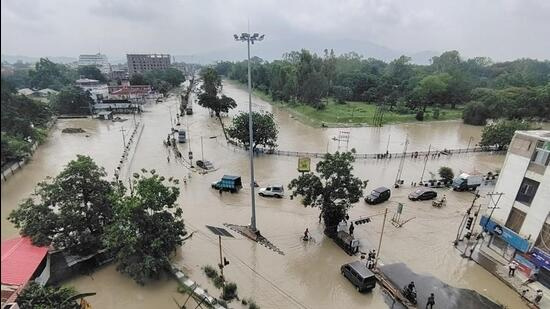The recent calamitous event of land sinking in Parnote village, Ramban district, has left over 500 individuals in dire need of assistance and permanent rehabilitation. As the ground continues to subside, it has not only damaged homes but also disrupted vital infrastructure, jeopardising the livelihoods of many
 KRC TIMES Desk
KRC TIMES Desk

The recent calamitous event of land sinking in Parnote village, Ramban district, has left over 500 individuals in dire need of assistance and permanent rehabilitation. As the ground continues to subside, it has not only damaged homes but also disrupted vital infrastructure, jeopardising the livelihoods of many.
This tragedy demands urgent attention from the government to ensure the affected families receive adequate compensation, relief, and a pathway to rebuild their lives. The scale of devastation is staggering, with more than 60 houses either partially or fully damaged due to the sinking land. Families have to abandon their homes, leaving behind all their belongings. The loss is not merely material but deeply personal, as recounted by survivors who have seen their life’s work crumble before their eyes.
The trauma inflicted on these families is immeasurable, compounded by the uncertainty of what lies ahead. Among the victims are children, whose education has been disrupted as they fled their homes in haste, leaving behind their school books and belongings. The emotional toll on these young minds cannot be overstated. Similarly, individuals who have spent a lifetime building their homes now find themselves homeless, pleading for assistance from the government to rebuild their shattered lives.
The response from the District Administration in Ramban has been commendable, with swift action taken to relocate affected individuals to safer accommodations and assess the damages. However, this is just the beginning of a long road to recovery. The immediate focus is on providing essential aid, such as food, shelter, and medical assistance, to those displaced by this tragedy. Every effort must be made to ensure their basic needs are met during this challenging time. Communities, both local and national, must come together to extend their support to the victims and ensure that no one is left behind in their time of need.
However, a comprehensive rehabilitation plan must be put in place without delay. Often, after the initial assistance and assurances, families are left to fend for themselves, which must be avoided at all costs. Timely intervention from the administration can significantly reduce the suffering of the affected people. This includes providing adequate compensation to the victims to rebuild their homes, as well as allocating land at safer locations for permanent resettlement.
The government must work closely with experts from the Geological Survey of India to determine the cause of the land sinking and devise strategies to prevent similar incidents in the future. Of utmost concern is the ongoing sinking of the land, which poses a threat to other areas and families. The road network has suffered severe damage, leading to additional unforeseen complications.
Moreover, adverse weather conditions exacerbate the challenges faced by the affected population. Despite these hurdles, the administration is mobilising all available resources for immediate relief efforts. However, sustained assistance is crucial to alleviating the suffering of those affected. The region has experienced multiple instances of land sinking, underscoring the need to address underlying fault lines comprehensively. With the GSI team already on-site, the root cause of the disaster may soon be identified. Once the causes are determined, the administration must devise an action plan to mitigate further damage and safeguard vulnerable areas.
Advertisement | KRC Times






